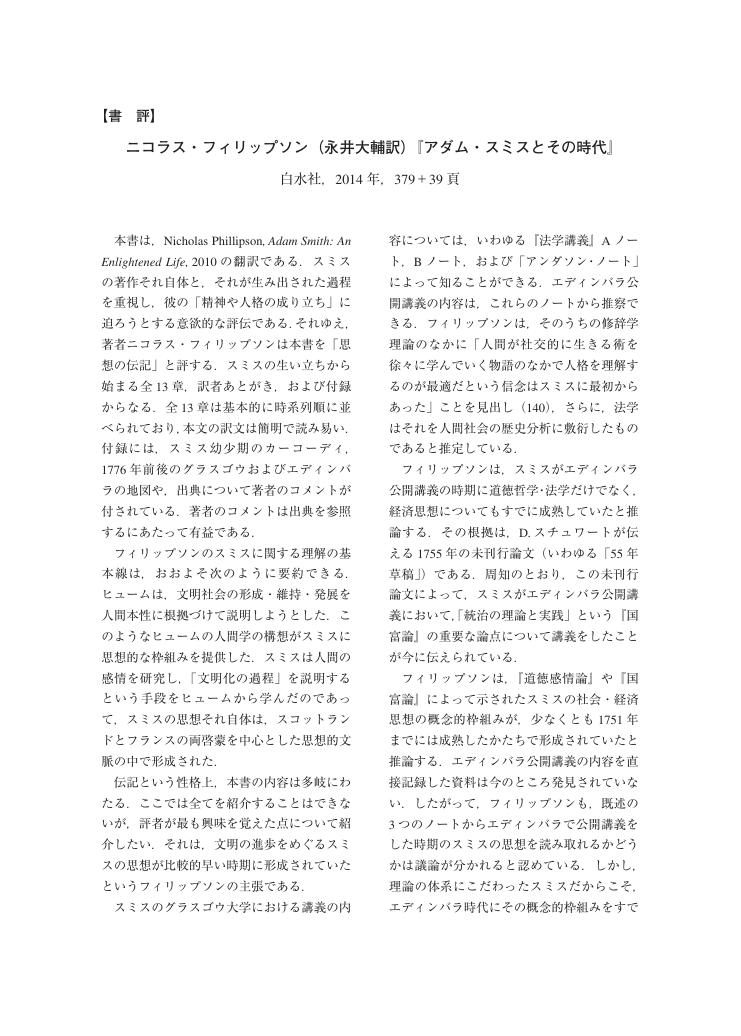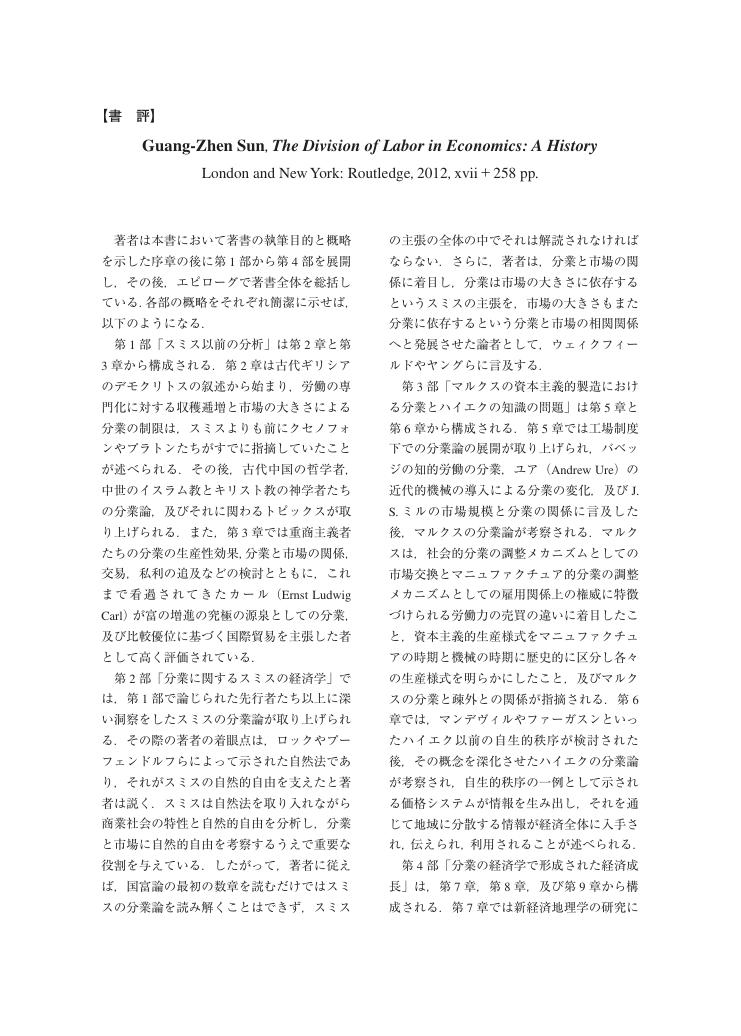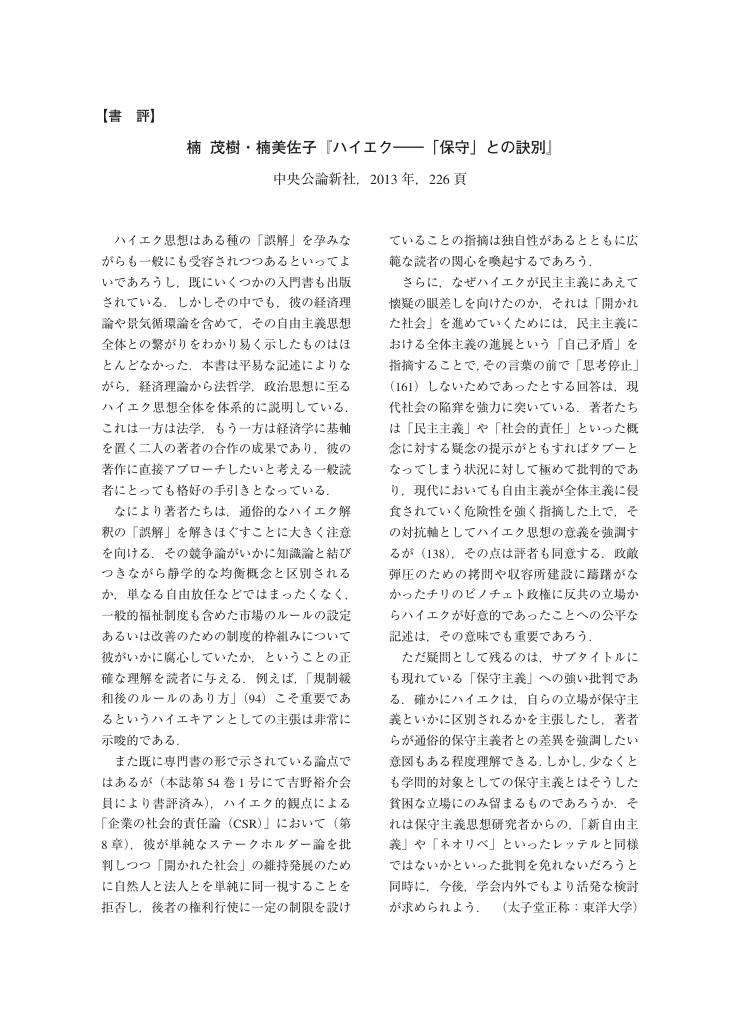1 0 0 0 OA On Takahira Kanda’s 'the People'
- 著者
- 南森 茂太
- 出版者
- 経済学史学会
- 雑誌
- 経済学史研究 (ISSN:18803164)
- 巻号頁・発行日
- vol.57, no.2, pp.46-67, 2016 (Released:2019-08-30)
Abstract: The purpose of this article is to show that Takahira Kanda’s( 1830―98) evaluation of “the people” was closely related to his political and economic reform plans. Since the early 19th century, ships from American and European countries had been coming to Japan, and the Tokugawa Shogunate felt compelled to reinforce their armaments. In order to raise the vast funds necessary for reinforcement, the shogunate tried to promote various domestic industries. The Meiji Government that later overthrew the shogunate also succeeded in such promotional policies. Thus, “the modernization” policies of the government spread to several fields, and the top governmental officials, bureaucrats, and western scholars presented numerous modernization plans, most of them insisting that the government carry out various reforms. However, they believed that “the people” were “ignorant” and did not have the ability to be involved with such reforms. On the other hand, Kanda evaluated “the people” as political and economic subjects. Such ideas had already appeared by the end of the shogunate. In Nosyoben( 1862), Kanda insisted that “the people” are independent economic subjects with political interest; he succeeded to gain recognition for his thoughts after the Meiji Era. Thus, the idea of the assembly and patent systems in Japan was based on the recognition of his thoughts. In order to carry out his reform plans, Kanda had to wipe out the evaluation of people made by the top governmental officials and bureaucrats and hence made his reform plans public through magazines and newspapers. His activities were closely watched by the top governmental officials, and finally the Meiji government managed to weaken his influence. However, his thoughts contributed much to the pioneering achievement of “the local notable theory” during the middle of the Meiji Era. JEL classification number: B 31.
1 0 0 0 OA 道徳的ルールとしてのアローの社会的選好順序
- 著者
- 斉藤 尚
- 出版者
- 経済学史学会
- 雑誌
- 経済学史研究 (ISSN:18803164)
- 巻号頁・発行日
- vol.57, no.2, pp.68-88, 2016 (Released:2019-08-30)
Abstract: This paper demonstrates how Arrow’s theorem formulates not only a social decision process but also serves to clarify moral rules; further, that such an interpretation is consistent with conventional understanding due to Arrow’s methodology that “the scientific method can elucidate ethical problems.” In order to achieve this aim, this paper traces the development of Arrow’s theory by examining the debate between Arrow and Bergson and Little, among others. We then argue that Arrow seeks to scientifically prove moral rules, in contrast to Bergson, whose economic theory cannot effectively address ethical problems. Finally, we apply Arrow’s methodology to the more general problem of the relationship between economics and philosophy. The structure of this paper is as follows: In Section II, we present the relationship between science and value in welfare economics prior to the publication of Social Choice and Individual Values (SCIV) in 1951. In Section III, we clarify that science and ethics-or the elucidations of the social decision process and of social welfare-appear in the first edition of SCIV. Section IV presents Bergson and Little’s criticism that Arrow does not methodologically ground the relationship between science and ethics. In Section V, we clarify Arrow’s methodological foundation and how it is affected by Popper’s thought, expressed in the statement “scientific theories can elucidate ethical problems.” In Section VI, we check Arrow’s methodology in the second edition of SCIV, published in 1963. Finally, Section VII demonstrates that Arrow considered social preference as a moral rule based on his methodology in the second edition of SCIV. JEL classification numbers: B 23, B 41, D71.
- 著者
- 田中 秀夫
- 出版者
- 経済学史学会
- 雑誌
- 経済学史研究 (ISSN:18803164)
- 巻号頁・発行日
- vol.57, no.1, pp.98-99, 2015 (Released:2019-11-26)
1 0 0 0 OA Luigino Bruni, The Genesis and Ethos of the Market. New York: Palgrave Macmillan, 2012, xiv+221 pp.
- 著者
- 奥田 敬
- 出版者
- 経済学史学会
- 雑誌
- 経済学史研究 (ISSN:18803164)
- 巻号頁・発行日
- vol.57, no.1, pp.100-101, 2015 (Released:2019-11-26)
- 著者
- 福田 進治
- 出版者
- 経済学史学会
- 雑誌
- 経済学史研究 (ISSN:18803164)
- 巻号頁・発行日
- vol.57, no.1, pp.102-103, 2015 (Released:2019-11-26)
- 著者
- 山田 正範
- 出版者
- 経済学史学会
- 雑誌
- 経済学史研究 (ISSN:18803164)
- 巻号頁・発行日
- vol.57, no.1, pp.106-107, 2015 (Released:2019-11-26)
- 著者
- 山﨑 耕一
- 出版者
- 経済学史学会
- 雑誌
- 経済学史研究 (ISSN:18803164)
- 巻号頁・発行日
- vol.57, no.1, pp.108-109, 2015 (Released:2019-11-26)
- 著者
- 篠原 久
- 出版者
- 経済学史学会
- 雑誌
- 経済学史研究 (ISSN:18803164)
- 巻号頁・発行日
- vol.57, no.1, pp.112-113, 2015 (Released:2019-11-26)
- 著者
- 川脇 慎也
- 出版者
- 経済学史学会
- 雑誌
- 経済学史研究 (ISSN:18803164)
- 巻号頁・発行日
- vol.57, no.1, pp.114-115, 2015 (Released:2019-11-26)
- 著者
- 山崎 聡
- 出版者
- 経済学史学会
- 雑誌
- 経済学史研究 (ISSN:18803164)
- 巻号頁・発行日
- vol.56, no.2, pp.152-153, 2015 (Released:2019-11-30)
1 0 0 0 OA イギリスにおける経済学史研究の形成 1870年代-1920年代
- 著者
- 西沢 保
- 出版者
- 経済学史学会
- 雑誌
- 経済学史研究 (ISSN:18803164)
- 巻号頁・発行日
- vol.57, no.1, pp.25-50, 2015 (Released:2019-08-27)
Abstract: This paper examines the history of economic thought studies in Britain in the age of neoclas-sical and historical economics from 1870 to 1914 (and thereafter). The historicism and his-torical methods of this age appeared to be behind not only the making of economic history but also the formation of history of economic thought studies. Economic history, after taking off in the last quarter of the 19th century largely because of the foundation of the English his-torical school, formation of the Economic History Society presided by W. J. Ashley, and issue of the Economic History Review in 1927, is institutionally separated from the Royal Econom-ic Society. What was the history of economic thought? In the decline and fall of English classical political economy, a new cohort of econo-mists such as Cliffe Leslie, Ingram, Bagehot, and Jevons asserted themselves. They opposed the methods of the classical school, particularly Ricardoʼs economic reasoning, and their un-orthodox literary review sought the free examination of new opinions and theories. Bagehotʼs Postulates was “a landmark in the history of economics,” Jevons was “the first of the distin-guished tribe of economic bibliomaniacs,” and Foxwell first caught the affliction and then made economic library with the “most splendid” work ever to be collected. The rise of a new cohort of economists and the activities and works of Jevons and Foxwell were the founda-tions of the history of economic thought. Jevons “discovered” Cantillonʼs Essai and Higgs conducted studies of Cantillon and Physiocrats, while Jevons wrote a history of mathematical economics and utility theory. Foxwellʼs collection of economic literature provided a thor-oughly historical edition of the Wealth of Nations. This was completed by Cannan, preceded and helped by Bonarʼs Catalogue of the Library of Adam Smith as well as John Raeʼs Life of Adam Smith. Bonar also wrote two books on Malthus. Toynbeeʼs Industrial Revolution, economic history integrated with the history of eco-nomic thought, generated a “reformist” group of economic and social historians. Ingramʼs History of Political Economy was a systematic study from a Comteian perspective; he was a leader among a group of men who successfully introduced humanitarianism into political economy or economics. Marshall was among them, and economic history and the history of economic thought were someway integrated into his economics. However, with the profes-sionalization and institutionalization of economics and economic history, the boundaries be-tween the disciplines of economics and economic history began to be marginalized and the history of economic thought became peripheral to both. JEL classification numbers: B13, B15.
1 0 0 0 OA ファーガスンからスミスへ 「注釈」にみる初期ガルヴェの道徳哲学
- 著者
- 大塚 雄太
- 出版者
- 経済学史学会
- 雑誌
- 経済学史研究 (ISSN:18803164)
- 巻号頁・発行日
- vol.57, no.1, pp.51-72, 2015 (Released:2019-08-27)
Abstract: This paper clarifies the story of Christian Garveʼs annotation (Anmerkungen des Ueberset-zers), which was attached to his translation into German of Adam Fergusonʼs Institutes of Moral Philosophy. Previous studies have indicated the importance of the annotation in light of Schiller and Hegel having read it while young, but few studies refer to its content. Garve has always been compared with famous philosophers rather than considered as a thinker in his own right. This paper, however, treats his annotation not as a mere explanation of an orig-inal text, but as revealing Garve's own moral philosophy. Without the annotation, the spread of Institutes in Germany would have been considerably diminished. Garveʼs annotation has several features. First, he places the utmost importance on the in-dependence of human action. Human beings should strive for moral perfection. The discus-sion on the distinction between humans and animals is symbolic of this matter. Second, Garve interprets carefully the difference of the meaning of words in German and English. This interpretation reveals that, as an Enlightenment philosopher, he was conscious of his readers. Third, the annotation shows the influence of Adam Smith's moral philosophy. We can find this in the discussion on “public repute” and “human right.” Fourth, like Ferguson, Garve thinks that human progress towards moral perfection is supported by the goodness of God. The most essential feature is the first one. The main context for Garve's moral philoso-phy is the description of human progress towards moral perfection. This accounts for the im-pression it made on the young Schiller. The third point is also very important, however, be-cause it hints at the direction of Garve's career, which extends to the translation of Smithʼs Wealth of Nations. JEL classification numbers: B12, B31.
1 0 0 0 OA D. スチュアートの過剰人口論 アダム・スミスの中国論との比較を通じて
- 著者
- 荒井 智行
- 出版者
- 経済学史学会
- 雑誌
- 経済学史研究 (ISSN:18803164)
- 巻号頁・発行日
- vol.57, no.1, pp.73-95, 2015 (Released:2019-08-27)
Abstract: This study aims to clarify Dugald Stewartʼs vision of civilized society, focusing on his view of overpopulation. Although it has often been considered that Stewart solved this problem by encouraging the development of commercial society and international free trade, he also paid attention to the problem of overpopulation in India and China at that time. In particular, the problem of overpopulation in China was discussed in the Notes of Stewartʼs Lectures on Po-litical Economy written by John Dow, who probably attended Stewartʼs lectures in 1808 and 1809. In this study, by focusing on Stewartʼs arguments about an excessive increase in popula-tion beyond the funds for the maintenance of labor in China, I show the significance of his view of civilization, which was related to his views on “theoretical or conjectural history.” Specifically, I consider the views of China of Adam Smith and Stewart in order to ascertain the characteristics of Stewartʼs original discussion on over-population. I also highlight the im-portant fact that their views of China were different from the level of economy, society, and culture in China and explain that there was a change in information and standpoint about China between the 18th and 19th centuries in Britain. Finally, I point out the historical signif-icance of Stewartʼs arguments on the quality of economic development and progress of hu-man society. JEL classification numbers: B 30, B 31, I 31.
- 著者
- 髙橋 信勝
- 出版者
- 経済学史学会
- 雑誌
- 経済学史研究 (ISSN:18803164)
- 巻号頁・発行日
- vol.56, no.2, pp.133-134, 2015 (Released:2019-11-30)
- 著者
- 村田 和博
- 出版者
- 経済学史学会
- 雑誌
- 経済学史研究 (ISSN:18803164)
- 巻号頁・発行日
- vol.56, no.2, pp.135-136, 2015 (Released:2019-11-30)
- 著者
- 諸泉 俊介
- 出版者
- 経済学史学会
- 雑誌
- 経済学史研究 (ISSN:18803164)
- 巻号頁・発行日
- vol.56, no.2, pp.137-138, 2015 (Released:2019-11-30)
- 著者
- 石田 教子
- 出版者
- 経済学史学会
- 雑誌
- 経済学史研究 (ISSN:18803164)
- 巻号頁・発行日
- vol.56, no.2, pp.139-140, 2015 (Released:2019-11-30)
1 0 0 0 OA 河野有里『田口卯吉の夢』慶應義塾大学出版会,2013年,ix+325+10頁
- 著者
- 南森 茂太
- 出版者
- 経済学史学会
- 雑誌
- 経済学史研究 (ISSN:18803164)
- 巻号頁・発行日
- vol.56, no.2, pp.141-142, 2015 (Released:2019-11-30)
1 0 0 0 OA 楠茂樹・楠美佐子『ハイエク――「保守」との訣別』中央公論新社,2013年,226頁
- 著者
- 太子堂 正称
- 出版者
- 経済学史学会
- 雑誌
- 経済学史研究 (ISSN:18803164)
- 巻号頁・発行日
- vol.56, no.2, pp.143, 2015 (Released:2019-11-30)
- 著者
- 壽里 竜
- 出版者
- 経済学史学会
- 雑誌
- 経済学史研究 (ISSN:18803164)
- 巻号頁・発行日
- vol.56, no.2, pp.144-145, 2015 (Released:2019-11-30)














